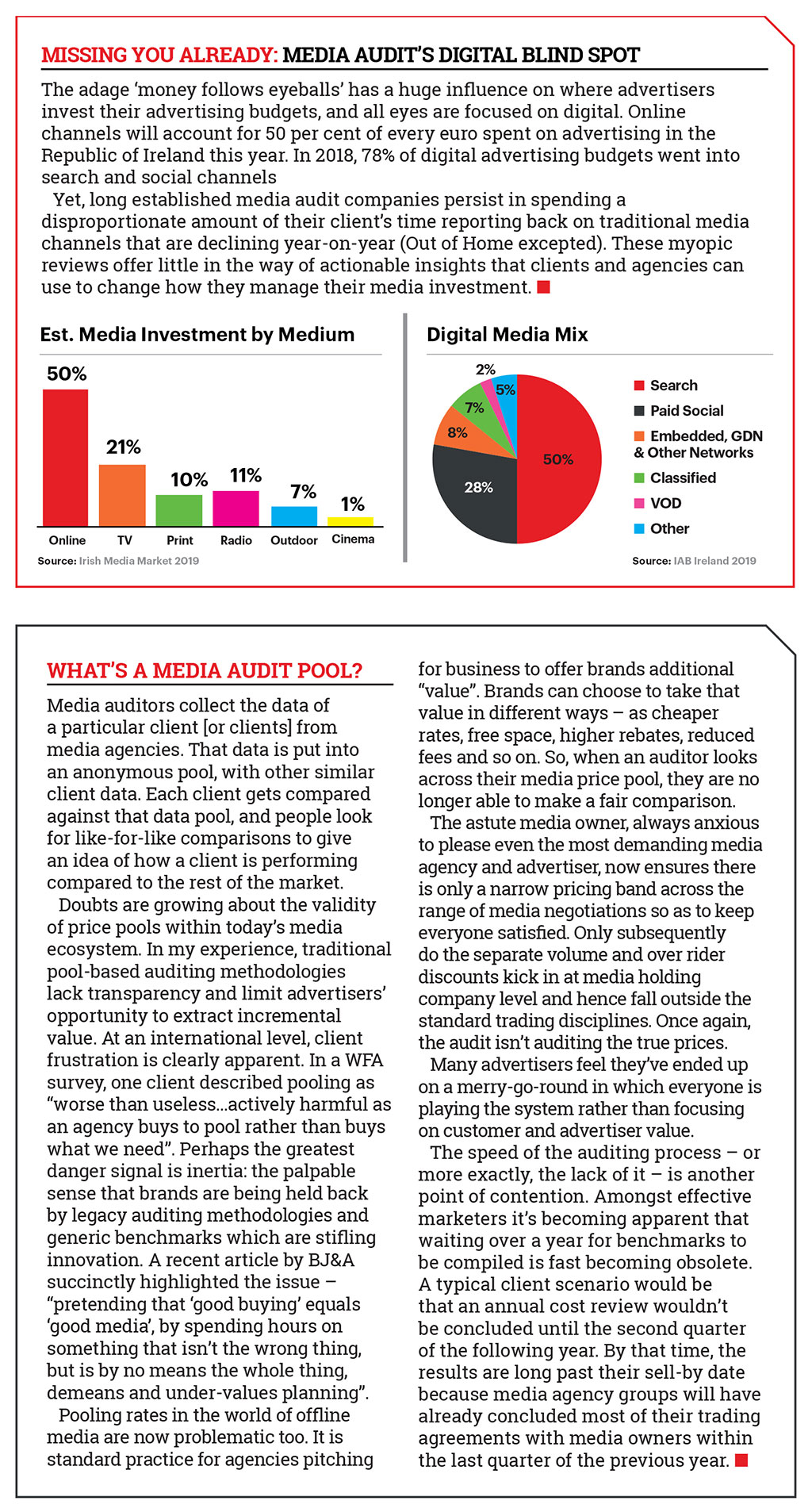
Media audits have become a thorny issue in the advertising world and now it’s time to hit the reset button on this dysfunctional practice, writes John Dunne.
Today’s media audits rarely deliver and they don’t tell advertisers what they really need to know. There are many reasons for this; one is that brands and even procurement people have bought into the myth that media discounts are what matter most. Cost-only media auditing is too narrow and doesn’t translate well into digital. The advertising media market is getting very complex.
When the media auditing business was first created, it embraced the simple concept that if you got together a pool of advertisers, added together their total spend in any one medium, in a given period, and divided this by the sum of the audience delivered, you would get an average value. This would provide a measure for comparing individual advertiser value. But seismic changes in the way media is now traded means this traditional process is flawed, produces misleading results, and is almost entirely broken.
The genesis of media auditing was a lack of pricing transparency. By measuring media costs against a pool, brands were taking out an insurance policy against over-paying. But now, for many brands, an increasing proportion of media spend is performance-based, with most media buys biddable or traded on outcomes. In the world of performance, a higher unit price may achieve a better outcome, so the old principles of lowest rate buying are misleading.
The big challenges that have confronted advertising over the past few years aren’t going anywhere fast or getting solved quickly. Marketers continue to grapple with the challenges of unpredictable competition, diminished trust, social media chatter and rapid technological change. They’re still looking for solutions to viewability, brand safety, transparency, ad verification, and marketing effectiveness. If there’s a trend that has marked the industry in the last two years, it’s confusion that comes from not knowing what the right metrics are, or what to do with them.
There’s a lot of talk in the industry about ‘accountability’ and ‘effectiveness’, but some clients and agencies behave in ways that make accountability difficult and effectiveness harder. In the Big Data era, it is tempting to believe that the impact of data-driven decisions will only increase. But as the availability of data grows, so does the level of noise. We need to get better at distinguishing the signals, or else the value of all this data will prove disappointing. There are signs this is happening already: recent WFA research indicates that 73% of clients agree that ‘the industry needs to move away from outmoded media price judgments to focus on value-based assessments’. Nearly all clients (96%) agree that ‘digital media requires a different assessment methodology to offline media’.
Should you audit your digital activities?
Despite the confusion I’ve described, should you audit your digital activities? The answer is still yes – although many brand owners in Ireland would be forgiven for answering no to this question. The current audit practices for digital, as offered by long established players, fail marketeers miserably.
There’s a clear lack of rigour when it comes to evaluation; the audit reviews are too superficial and the analysis too short-term. The audits rarely cover search, social, programmatic, partnerships and campaign operational set-ups.
The more sophisticated advertisers recognise that applying the old way of auditing media to digital media activities isn’t appropriate and are asking for alternatives. Naturally, advertisers demand proof that their investment in media has been used effectively and in line with their media investment contracts. An initiative by Joint Industry Committee for Web Standards (Jicwebs), an industry body representing all sides of the digital advertising industry in the UK, offers a good insight into how technology could help boost the efficiency and transparency of digital ad buys by providing end-to-end supply chain transparency and clarity around advertising spend.
While media auditing isn’t going away, the core focus of an audit is swinging away from retrospective cost and quality comparisons. A more nuanced approach is needed.
Considerations for independent media audits
More recently, agencies and media suppliers have become increasingly concerned about specific auditing and media benchmarking practices and dynamics.
- Conflicts of interest
There is growing concern, and rightly so, about the potential conflicts of interest with the long-established media auditing companies at a global level. Up to now, a lack of competition in this area offered clients little or no choice. In Ireland, a monopoly of sorts around media auditing can’t be good for anyone, can it?
- Data requests not aligned with the contract
Today’s digital-centric media marketplace has inevitably led to greater caution as media agencies now provide auditors with significant volumes of highly sensitive and confidential data. Agencies have voiced reservations that auditors sometimes ask them to provide data beyond the details stipulated in the agency/client contract.
- Audit companies in the pitch process
Pitching is a highly sensitive process during which agencies reveal a great deal of confidential information, creative ideas and strategic advice. Advertisers often hire pitch consultants who advise them throughout the process. I believe it is crucial that pitch consultants are able to operate completely impartially. In Ireland, the reality is that some media auditors do both.
It’s common practice that a media agency could be audited one week for client X and the next week are pitching for client Y – with a long-established media auditor being the common denominator in both instances. Put yourself in the agency’s shoes: would you challenge the outputs from the auditor and risk a poor outcome from a pitch that the same company is managing a week later? Is it any wonder some media audit review meetings can feel like a pointless exercise?
So, how do you achieve more transparent, honest dialogue and strengthened co-operation between all parties?
Modern media audits – the way forward
Modern auditing is about demonstrating a clear understanding of the relationship between effectiveness and economic value. The unpleasant truth is that long-established media auditors are auditors of price. Many individuals involved in media auditing aren’t from a planning background. Many would struggle to ask the key questions to unearth any undue influence by agency deals on a clients’ media supply chain and desired business outcomes. They’re not fulfilling the purpose they were intended for; to answer simple client questions like: ‘are we winning’, ‘what does good look like’ or ‘are we getting value’?
A traditional audit doesn’t allow any of this, which is why a new approach to the conventional audit model is required. A value-based media audit makes for more meaningful reviews based on identification and measurement of strategic goals for media activity that isn’t solely focused on short-term outcomes, identifies more opportunities for extracting value, and improves performance with a customised assessment of media buying strategy and execution. In this new auditing world, measurement of client specific KPIs and analytics replaces price pooling as the central capability; transparency replaces opacity; fast replaces slow; and self-empowerment replaces over-reliance on your media agency.
Fit for purpose – next generation media audit reviews
Now more than ever, brands need truly independent help to navigate the world of unlimited choice and seismic changes in media consumption. A good media audit delivers findings that matter to your bottom line and lead to action. Report outputs should be quantifiable, constructive and irrefutable. Avoid using pointless metrics that have no real consequence for the client’s business, or inconsequential media buying cost reviews that are limited to traditional media channels. It’s imperative the scope of your media audit takes a holistic view of your media investments that cover all paid media channels.
When so much spending is moving to digital, you need to get a meaningful assessment of the value added from your digital media spend. It’s time to identify your strategic KPIs and get a complete picture that allows you to make more informed decisions about future media choices to deliver against your business objectives.

John Dunne is managing director of Ignite Digital
First published in Irish Marketing Journal (IMJ Agency Issue 2019)© to order back issues please call 016611660






















